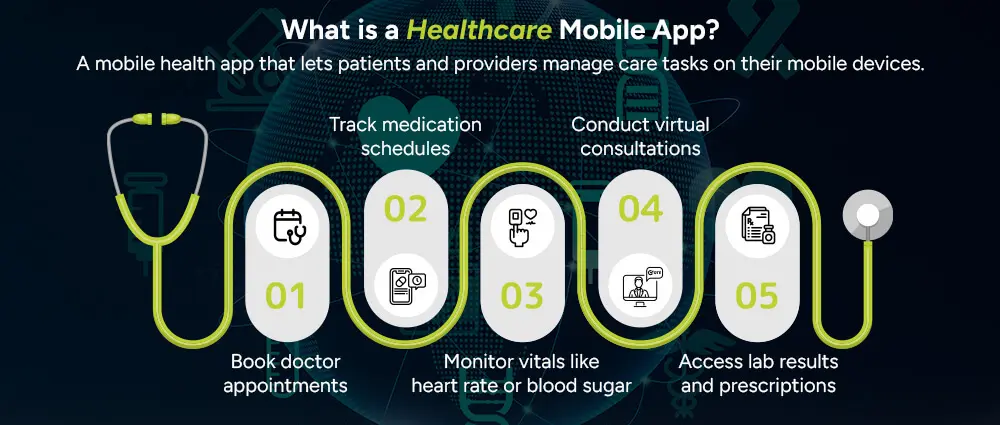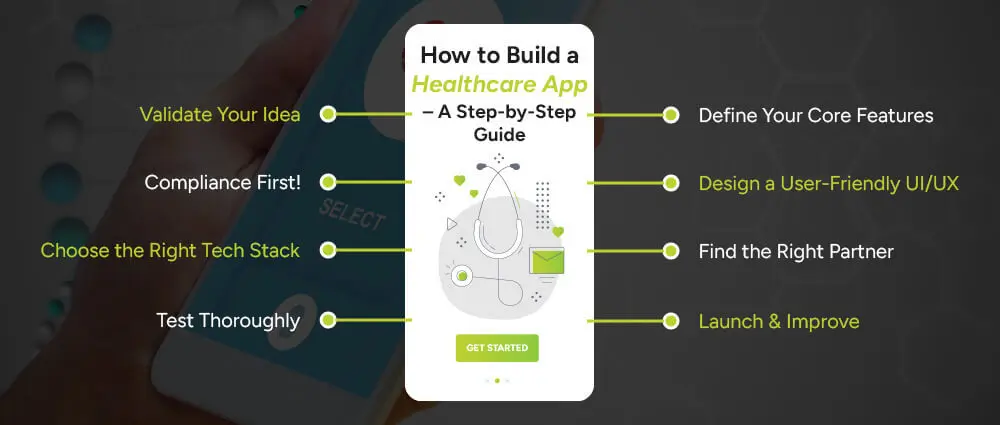Healthcare is no longer confined to hospitals and clinics; with the tech-driven landscape of today, combined with remote care, you can have everything at home. With just a few taps on your phone, you can schedule appointments, access your medical records, or even speak to a doctor, thanks to healthcare mobile app development.
Whether you’re a startup founder, a hospital admin, or someone with a brilliant idea to revolutionize care delivery, this blog is your go-to healthcare mobile app development guide. From turning your idea into a fully functional app to choosing the right partner, we’re covering it all, step by step.
Let’s start with the basics.
A healthcare mobile app is any application that helps patients or healthcare providers manage health-related tasks on mobile devices. These apps can do a variety of things, like:

In short, they put essential healthcare services right in your pocket.
According to Deloitte, healthcare is rapidly moving toward modern technology. Around 60% of providers now see platforms like EMRs and ERP systems as essential for their long-term operations, and nearly 90% of executives believe digital transformation will accelerate even further in
Mobile app development for health care is mainly focused on making care uncomplicated and hassle-free for all.
Generally, the benefits that each party takes away are:
So, we can say that mobile app development in healthcare is transforming the way patients and providers interact, making medical services more accessible, efficient, and personalized. From enabling remote consultations and real-time health tracking for patients to reducing administrative tasks and offering valuable data insights for providers, these apps are revolutionizing care delivery. As technology continues to advance, mobile healthcare solutions will only grow more essential in creating a connected, responsive, and inclusive healthcare ecosystem.

Building a mobile healthcare app development project from scratch can sound daunting, but breaking it down helps. Here’s your roadmap when it comes to mobile app ideas for 2025 for all industries, especially healthcare:
Is your app solving a real problem? Talk to doctors, nurses, patients, and insurers for real insights. Research competitors. Know what makes your idea different.
Start by identifying the exact healthcare problem your app will solve. Study the current market to see what solutions already exist and how yours stands out. Validation ensures you’re building something people actually need and will use, whether you need a mobile app for SMBs or any large enterprise.
Don’t overload your first version. Focus on the must-haves, avoid including everything in the first version, and prioritize what users value most:
We can focus on detailed features later on, but first and foremost, you need the structure of your application.
Healthcare apps deal with sensitive personal data, compliance isn’t something that you can take as an optional thing. Make sure your app follows healthcare laws like:
This step is critical when building trust and ensuring patient data safety. Being compliant also builds trust, keeps you legally and ethically protected, and these laws also regulate how health data is stored and shared.
Simplicity is key. Healthcare users are often not tech experts. Make sure your app is intuitive, clean, and accessible because Healthcare users span all ages and tech comfort levels. Use clean layouts, large buttons, and clear navigation for easy interaction.
Decide whether you’re going for native stack for iOS, Android or a cross-platform app framework like Flutter, React Native. This impacts cost, time, and performance.
But what do you need to look for? Select technologies based on your goals, timeline, and budget. When it comes to cross-platform tools like Flutter or React Native, reduce cost and time. Don’t forget backend technologies and integrations with EHR or cloud platforms.
Working with a reliable healthcare mobile app development company ensures your app is secure, scalable, and built with industry best practices. Make sure that the healthcare mobile app development service you collaborate with brings technical expertise and knowledge of industry standards and risks. With a good partner, you can ensure that the app is secure, scalable, and easy to maintain. You can develop your healthcare mobile app with Arpatech, a team trusted by businesses worldwide for end-to-end development.
Before the launch, test everything: functionality, security, speed, and user experience. Include healthcare professionals in your beta testing phase.
Testing isn’t just about fixing bugs; it ensures patient safety and reliability. You should make sure that the company runs usability tests, security audits, and stress tests across devices. This phase is used to refine workflows and fix any potential friction points.
Launch your MVP, gather feedback from real users, and keep iterating. Healthcare is always evolving, so your app should too.
Monitor performance, crash reports, and user behavior analytics post-launch. Iterate quickly, release improvements and new features in regular updates. We just need to remember that the healthcare landscape is dynamic, and all apps must evolve with it.
Many businesses like ecommerce are now using AI apps to give out a more appealing look to their audience. Depending on your app’s goals like doctor-patient interaction, wellness tracking, hospital admin, etc., here are some key features to consider:
The right set of features depends on your users, goals, and region.
Choosing a development partner is just as important as the app idea itself.
Here’s what to look for in a healthcare mobile app development company:
If you’re looking for all of the above, develop your healthcare mobile app with Arpatech. We’ve helped startups and hospitals bring impactful healthtech ideas to life.
At Arpatech, our healthcare and fintech mobile app development services are built around your unique needs. Whether it’s a patient engagement platform, an EMR app, a telehealth solution or adding the benefits of AI in mobile app development, we handle:
Let’s turn your idea into an app that makes a real difference.
Healthcare mobile app development is more than just coding; it’s about creating tools that can improve lives. Whether you’re starting from scratch or upgrading an existing system, partnering with the right experts makes all the difference.
From ideation to deployment, we understand the nuances of healthcare technology. So, if you’re wondering how to build a healthcare app or looking for trusted mobile app development healthcare professionals, develop your healthcare mobile app and software with Arpatech, we’ve got you covered.
Let’s build something that matters, for you, your users, and the future of care
It depends on the complexity, features, platform (iOS/Android/both), and whether it’s HIPAA-compliant. On average, the cost of healthcare mobile app development can vary from thousands to a few million dollars, all depending on the complexity and technology stack. A basic MVP might be on the lower end, while full-scale apps with advanced features can go higher.
Again, it depends on your scope. A simple MVP may take 3–5 months, while a feature-rich app could take 6–12 months or more. Including testing and compliance adds to the timeline but is well worth the effort.
Mobile app development in healthcare are used for:
If we go more into the niche of things and work our way into every department in the healthcare industry, we can look for and bring advancement to each department, thus creating more apps to work with in the future and bringing automation in every aspect of care.